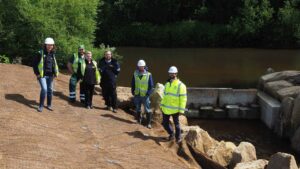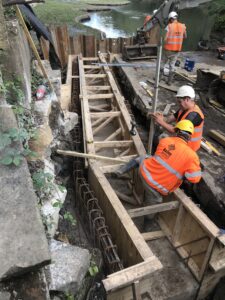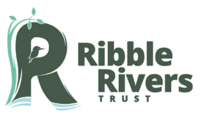Important Ribble Rivers Trust projects continue to flow despite the challenges of the COVID-19 lockdown.
Work has just finished on an impressive fish bypass channel at Holland Wood Weir in Walton-le-Dale and it’s started on another at Primrose Lodge in Clitheroe.

The Walton-le-Dale project, funded with European rural development funding through the Water Environment Grant, allows migrating fish, including salmon and trout, to swim upstream, increasing their breeding habitat.
Beautiful as well as practical, it effectively creates an additional river channel on an historic mill site, owned by animal feed business, Massey Feeds.
In the past, the large weir, of a design known as a Crump Weir, would have diverted water to the 19th Century mill to drive its machinery.
Approximately 27m wide, the weir is now redundant and, with the River Darwen, forms the backdrop to a community football pitch, also on Massey Feeds’ land.
Massey Feeds operations manager, Ian Barnes, said: “As a 5th generation family business serving the agricultural community we’re thrilled to have played our part in this project. The land by the river is not used for our animal feed making activities, so a project which improves the environment for local wildlife in a way that can be appreciated by the local community brings benefits to everyone. It’s been over two years in the making, so we’re delighted to see it completed and excited to see the benefits it will bring to the area.”
Jack Spees, RRT chief executive, explained: “With over 1000 structures obstructing fish across the Ribble catchment, it’s great to see these projects coming to fruition. The work at Walton-le-Dale is part of a wider programme trying to return migratory fish to the heart of Blackburn, re-connecting not just rivers for fish, but also river species with communities around rivers.
We have more barriers to tackle on the Darwen, but with each one made passable, we take another significant step.”

The Primrose Lodge project involves creating arguably the longest fish pass in England and is funded by the European Regional Development Fund through the Ministry for Housing, Community and Local Government.
The challenging situation of water flowing out of the lodge or pond, under a road bridge and between industrial buildings and domestic properties, requires a different design known as a technical fish pass. This concrete chute with internal baffles to disrupt the flow will extend to around 40m downstream along the river channel.
Adam Walmsley, RRT capital works officer, said: “Primrose Lodge has been talked about as a potential local nature reserve for over twenty years. The Ribble Rivers Trust team have developed and are delivering this project, supported and enabled by the Primrose Community Nature Trust which took over the land last year. We have already de-silted around half of the lodge and created a new footpath along the western edge of the site.
The fish pass is the third phase of the project and has taken a huge amount of effort, but we’re very happy with how it’s going.”
For more details on these and other projects, visit www.ribbletrust.org.uk and RRT’s Facebook page: https://www.facebook.com/RibbleTrust.
Ribble Rivers Trust (RRT) is a local environmental charity established in 1997 to protect and restore the rivers, streams and watercourses within the Ribble catchment and to raise public awareness of the value of our local rivers and streams. The Ribble catchment is the area of land that is drained by the River Ribble and its major tributaries; the Hodder, Calder and Darwen. It covers a varied landscape, from the rural hills of the Yorkshire Dales and the source of the River Ribble, to major urban areas of Lancashire including Blackburn, Burnley and Preston.
RRT have completed over 60 fish pass projects since 2008, when it became one of their priorities.
For more information please contact 01200 444452 or visit www.ribbletrust.org.uk
European Regional Development Fund
The Primrose Lodge project is receiving up to £500,768 of funding from the England European Regional Development Fund as part of the European Structural and Investment Funds Growth Programme 2014-2020. The Ministry of Housing, Communities and Local Government (and in London the intermediate body Greater London Authority) is the Managing Authority for European Regional Development Fund.
Established by the European Union, the European Regional Development Fund helps local areas stimulate their economic development by investing in projects which will support innovation, businesses, create jobs and local community regenerations. For more information visit https://www.gov.uk/european-growth-funding.
Water Environment Grant
The Water Environment Grant (WEG) scheme provides funding to improve the water environment in rural England, which includes:
- rivers and their estuaries
- lakes
- canals
- wetlands
- groundwaters
- coastal waters
Funding comes from the European Agricultural Fund for Rural Development (EAFRD) and is part of the Rural Development Programme for England (RDPE).
###

